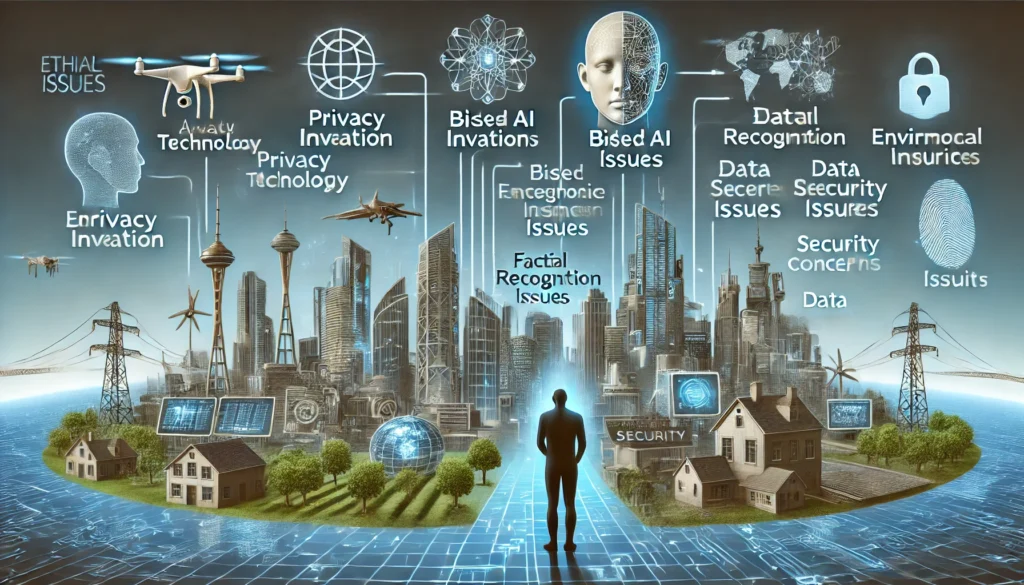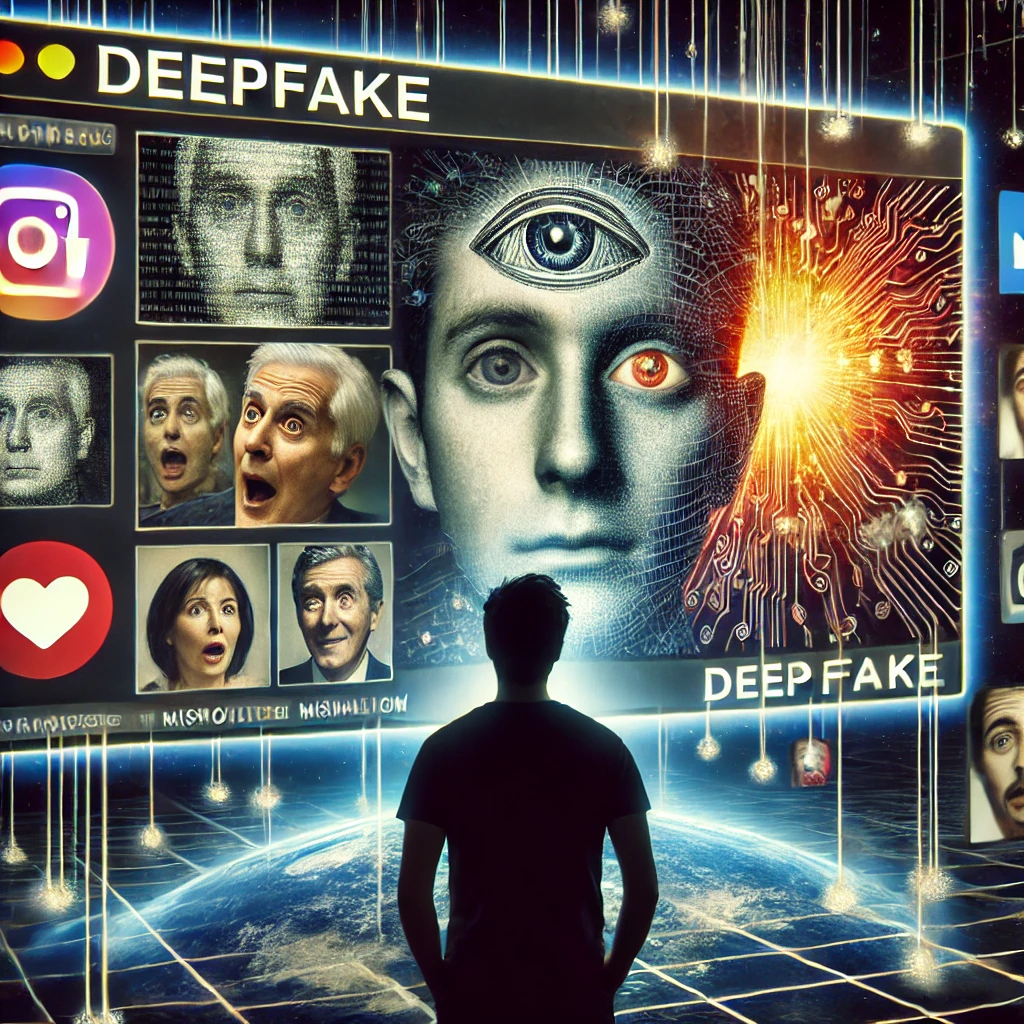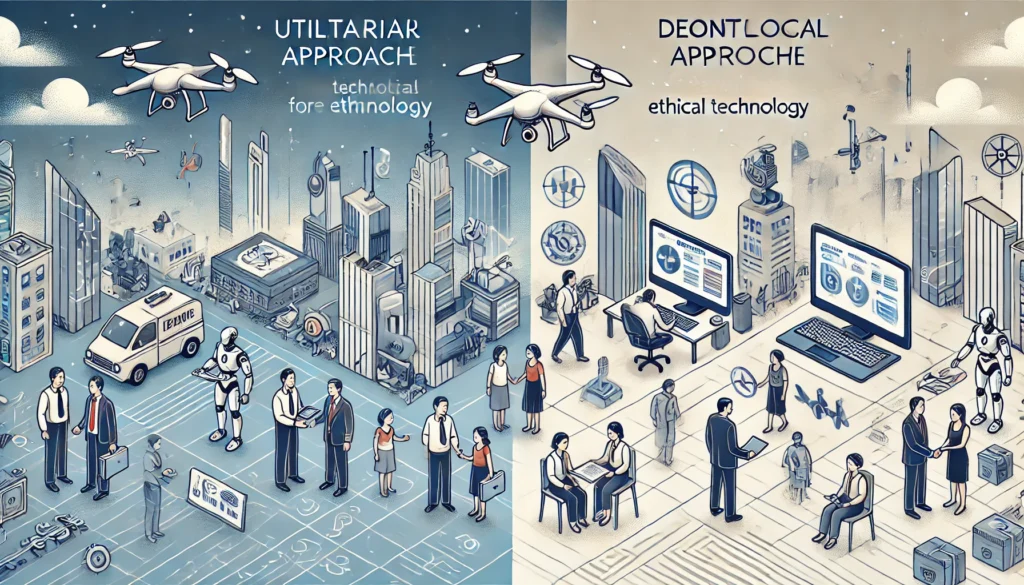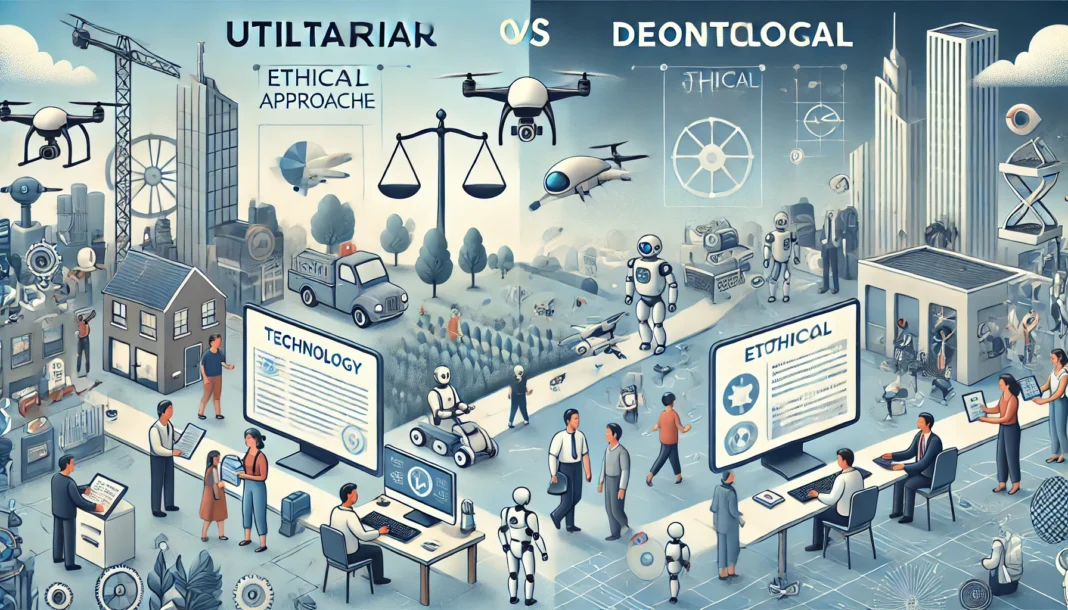Introduction to Tech Ethics: Why Ethical Consideration is Important
We live in a world dominated by technology. Therefore, ignoring the importance of tech ethics is impossible. Tech advances rapidly, affecting our lives in many ways—from the data we share to AI-driven decisions. This makes ethical consideration crucial. But what exactly are tech ethics, and why do they matter?
Tech ethics are the moral principles that guide technology development, ensuring innovations align with societal well-being. They promote responsible technology use for both immediate and long-term benefits. Understanding tech ethics helps address complex issues such as privacy, data misuse, and algorithmic bias.
When ethical considerations are neglected, the consequences can be severe. Unchecked use of data, unethical AI decisions, and disregard for privacy can cause harm to individuals and communities. This makes it essential for companies and policymakers to embed ethical thinking in their processes. Ethical standards are not optional—they are foundational for safe and responsible innovation.
Defining Tech Ethics
Tech ethics involves applying ethical principles to technological innovation. It ensures that technology benefits society as a whole. Progress brings many advantages, but it also introduces ethical dilemmas that require careful consideration.
Tech ethics helps answer essential questions. Is it right to collect and use certain data? Should AI be deployed in sensitive sectors like healthcare without proper oversight? Who takes responsibility when an algorithm discriminates against individuals or groups? These are questions that tech ethics aims to address.
Balancing progress with well-being requires a clear ethical framework. Ethical considerations like user autonomy, privacy, fairness, and transparency are fundamental to tech development. These principles ensure responsible advancements without compromising individual rights. Ethical questions can be contextual. What is ethical in one region may not be seen the same way in another. Developers must consider these multiple perspectives when developing new products.
How Ethical Issues Arise with Technology Advancements

Technology advancements are exciting, but they often bring unintended ethical challenges. For instance, when social media platforms were first developed, no one foresaw their potential to manipulate elections. This unintended consequence highlights the ethical dilemmas inherent in technological growth.
Similarly, AI technology has introduced smart assistants that make our lives easier. However, these assistants also raise concerns about surveillance, privacy breaches, and inherent biases. The very data used to develop these tools can inadvertently cause harm.
These examples illustrate how ethical challenges can arise from well-intentioned innovations. Developers must consider not just what is possible, but also what is responsible. Ethical foresight is necessary to prevent misuse and negative consequences.
Collecting data for innocent purposes can often lead to misuse. Technology evolves faster than regulations, creating ethical issues. Developers must consider moral consequences beyond technical feasibility to prevent harmful outcomes.
Ethical Challenges in Modern Technology
Privacy Concerns and Data Misuse
Privacy is one of the most pressing ethical challenges today. With social networks, smartphones, and IoT, personal data has become a valuable currency. Companies often collect large amounts of data without full transparency.
This drive to collect data often leads to misuse. Data breaches expose users’ private information, while data-sharing practices with third parties can exploit user vulnerabilities. Such misuse erodes trust and leads to serious social repercussions.
Bias in Algorithms and AI Decision-Making
Another significant ethical challenge is algorithmic bias. Algorithms influence countless decisions—from news to loans and sentencing in courts. However, these algorithms reflect biases in their training data. If data has biases, these biases transfer into the AI system.
The consequences of biased AI are severe. For example, biased facial recognition leads to wrongful identifications. Biased hiring algorithms disadvantage specific demographic groups. Addressing these biases is crucial to ensure fairness and trust in AI systems.
Ethical Dilemmas in Autonomous Vehicles
Autonomous vehicles bring significant ethical dilemmas that require careful consideration. For instance, who should an autonomous car protect in an unavoidable accident? Should it prioritize the safety of the driver, or should it value the lives of pedestrians instead? These questions pose serious challenges that cannot be answered easily.
The complexity lies in the moral judgments that need to be programmed into these vehicles. Each scenario is unique, and making ethical decisions under such circumstances is incredibly difficult. The stakes are high, as these decisions directly impact human lives. This means developers must think ahead and make tough ethical choices while programming these systems.
Therefore, developers must incorporate ethical decision-making frameworks into vehicle algorithms. These frameworks should consider different scenarios and provide clear guidelines. By doing so, autonomous vehicles can navigate ethical challenges responsibly. The goal is to make decisions that balance safety, fairness, and the value of human life, ensuring trust in autonomous technology.
Deepfake Technology and Misinformation

Deepfake technology enables the creation of hyper-realistic fake videos. At first glance, this technology seems harmless, even entertaining. However, it has also raised significant ethical concerns that need urgent attention. Deepfakes can be manipulated to deceive viewers, making it challenging to differentiate between what is real and what is fake.
One of the biggest ethical issues is the use of deepfakes for spreading misinformation. For instance, malicious actors can create fake videos to influence public opinion, distort political narratives, or cause panic. Moreover, deepfakes are also used for blackmail and fraud, putting innocent people at risk of reputational and financial harm. These risks illustrate the darker side of this innovative technology.
Nevertheless, deepfake technology does have positive uses. It can be leveraged for creative purposes, such as entertainment or education, offering new ways to engage audiences. The real challenge lies in preventing misuse while promoting beneficial uses. Developers, lawmakers, and users must collaborate to establish ethical guidelines and safeguard against malicious intent. By balancing innovation with responsibility, it is possible to use deepfakes in a way that benefits society without causing harm.
Job Displacement Due to Automation
Automation is advancing rapidly, leading to the replacement of many traditional jobs. This shift creates significant ethical concerns about job displacement and widening societal inequality. When jobs disappear, workers face uncertainty, financial strain, and loss of identity. Addressing these issues is crucial for ensuring a fair transition.
Companies must consider how to support workers affected by automation. One important step is investing in retraining programs. These programs help displaced workers acquire new skills, allowing them to transition into new roles. By focusing on skill development, companies can ease the burden on affected workers and help them regain employment.
Additionally, companies need to ensure responsible deployment of automation technologies. This involves using automation thoughtfully, without completely replacing human roles where possible. Maintaining a balance between automation and human jobs can help prevent large-scale unemployment. By planning for these transitions ethically, companies can help mitigate the negative impacts of automation and contribute to a more equitable society.
Surveillance and the Erosion of Privacy
Surveillance technology is growing in both sophistication and reach. It is used by governments and corporations for security. However, this increased surveillance often comes at the cost of individual privacy. The line between security and privacy has become increasingly blurred.
Balancing security needs with the right to privacy presents significant ethical challenges. When surveillance is unchecked, it can lead to abuses of power. Citizens may feel constantly watched, which undermines trust in authorities. Therefore, it is essential to establish boundaries that respect privacy while ensuring public safety.
To maintain public trust, transparency in surveillance practices is crucial. Authorities must clearly communicate why surveillance is used and how data is handled. Without transparency, people are less likely to trust the technology or those who deploy it. Ethical surveillance requires open communication, clear policies, and a commitment to respecting individual rights.
Privacy Concerns and Data Misuse
Privacy concerns are the most visible ethical challenge today. With the rise of social networks, smartphones, and IoT, personal data has become currency. Companies collect enormous amounts of data without always being transparent about its use.
Bias in Algorithms and AI Decision-Making
Another significant ethical challenge is algorithmic bias. Algorithms influence countless decisions—from news to loans and sentencing in courts. However, these algorithms reflect biases in their training data. If data has biases, these biases transfer into the AI system.
The consequences of biased AI are severe. For example, biased facial recognition leads to wrongful identifications. Biased hiring algorithms disadvantage specific demographic groups. Addressing these biases is crucial to ensure fairness and trust in AI systems.
Key Tech Ethics Frameworks for Technology Development
Utilitarian and Deontological Approaches in Tech

Navigating ethical challenges requires applying ethical frameworks. Two main frameworks are utilitarianism and deontology.
Utilitarianism focuses on actions that maximize happiness and reduce harm. In tech, this means evaluating whether data use benefits outweigh privacy risks.
Deontology, on the other hand, centers on duties and rights. It argues that some actions are inherently right or wrong. In tech, this means respecting user autonomy as a right. Deontological ethics insists on obtaining user consent before collecting data.
How Ethical Frameworks Guide Responsible Innovation
Ethical frameworks help developers go beyond technical and business aspects. They ask questions about the greater good and respecting fundamental rights. By incorporating ethics at the design stage, technologies can be safer and more respectful of user rights.
Consider AI in healthcare. A utilitarian approach might promote AI for quick diagnoses. However, a deontological perspective insists on patient consent and explainability. Balancing these perspectives drives responsible innovation.
Examples of Technology Policies Shaping Tech Ethics
California Consumer Privacy Act (CCPA)
The California Consumer Privacy Act (CCPA) was introduced to protect consumer data and ensure transparency. It grants users the right to know what data companies collect about them. Additionally, it allows users to request that their data be deleted if they choose. This provision empowers individuals to take control of their personal information.
Moreover, the CCPA requires companies to disclose how they use the collected data. They must inform users if data is shared with third parties. This transparency helps consumers understand how their information is being handled. As a result, users can make informed decisions regarding their privacy.
Overall, the CCPA aims to enhance data privacy and give consumers greater control over their personal data. By setting strict guidelines, it holds companies accountable for their data practices. This policy represents a significant step forward in protecting consumer rights in the digital age.
Digital Services Act (DSA) – A Step to Tech Ethics
The EU’s Digital Services Act (DSA) seeks to regulate digital platforms comprehensively. It focuses on removing harmful content, ensuring user safety, and enhancing platform accountability. By creating these safeguards, the DSA aims to make online spaces safer and more trustworthy for users.
One significant aspect of the DSA is the requirement for digital platforms to respond quickly to illegal content. Platforms must remove harmful content efficiently to protect users from misinformation and abuse. This not only ensures a safer experience but also encourages platforms to take their responsibilities seriously. With these provisions, users gain confidence that digital platforms prioritize their safety.
Furthermore, the DSA emphasizes transparency and accountability. It mandates that platforms disclose their algorithms and decision-making processes. This transparency helps users understand how content is curated and how decisions are made. The DSA ultimately aims to create a balanced environment, where digital platforms act ethically and users feel informed and protected.
China’s Personal Information Protection Law (PIPL)
China introduced the Personal Information Protection Law (PIPL) to regulate the handling of personal information. This law is one of the most comprehensive data privacy regulations in China. It mandates that companies must obtain explicit consent from users before collecting their data. Additionally, it ensures that personal data is processed in a manner that respects user rights and maintains data security.
The PIPL requires companies to be transparent about how they collect, use, and share personal information. Users must be informed about data handling practices, including any sharing with third parties. This transparency aims to empower users by giving them greater control over their information.
Overall, PIPL has significantly influenced data practices in China. It emphasizes user rights, data security, and corporate responsibility. By implementing strict guidelines, the PIPL aims to protect individuals from data misuse and ensure that companies handle personal data ethically. This policy represents a major step forward in China’s approach to data privacy, setting an important example for other nations.
GDPR and Its Impact on Data Privacy
Policy plays a critical role in enforcing ethical standards in tech. The General Data Protection Regulation (GDPR), introduced by the EU in 2018, has set a high bar for data privacy and protection. It requires companies to be transparent about their data collection practices, making users aware of what information is gathered and how it is used.
Moreover, GDPR mandates that companies obtain explicit consent before collecting personal data. This ensures that users have the final say over their information, empowering them to maintain their privacy. GDPR also provides users with the right to request deletion of their data, giving them control over what remains accessible.
The impact of GDPR has been significant, shaping data handling practices not only in Europe but worldwide. Many companies outside Europe have adopted similar privacy standards to stay compliant and trustworthy. GDPR has pushed organizations to rethink their data policies, placing privacy and user rights at the forefront of their operations. This regulation has undoubtedly strengthened data privacy and set an important precedent for the future of tech ethics.
GDPR has significantly shaped data handling practices globally. Companies worldwide have adopted similar standards to remain compliant. GDPR compels companies to rethink their data collection and usage strategies.
Emerging Tech Policies Regulating AI and Digital Platforms
AI and digital platforms are facing growing scrutiny from regulators worldwide. Governments are drafting policies to address transparency, accountability, and fairness in AI technologies. These policies are crucial for establishing ethical standards and ensuring responsible development.
For example, the EU’s proposed AI Act aims to classify AI systems based on their associated risks. High-risk AI applications, like those used in law enforcement, are subject to stringent requirements. This means that these systems must meet higher safety standards to minimize the potential for harm.
Moreover, the AI Act also promotes transparency by mandating that AI developers disclose key information about their systems. This includes explaining how the AI makes decisions and ensuring it complies with ethical guidelines. Such measures are designed to protect users and promote trust in AI technology. Establishing these boundaries is essential for preventing misuse and promoting fair, ethical AI practices.
Such policies establish boundaries to prevent harm and define acceptable practices for AI development.
The Role of AI and Tech Ethics in the Tech Industry
Addressing Bias in Machine Learning
A major concern in AI ethics is bias in machine learning models. These models learn from real-world data. If data contains biases, the AI will likely reflect them. For example, an AI trained on biased hiring data may perpetuate gender discrimination.
To address this, developers must be mindful of the data they use. Techniques like re-sampling data and auditing AI systems help minimize risks. Diversity among AI developers also helps reduce biases, as diverse teams identify issues more effectively.
Fairness, Accountability, and Transparency in AI
AI ethics revolves around three key principles: fairness, accountability, and transparency (FAT). Fairness ensures AI does not disadvantage any group, while accountability addresses responsibility for harm. Transparency clarifies AI decision-making processes for users.
Incorporating these principles helps prevent the worst outcomes of biased AI systems. FAT principles provide a benchmark for ethical AI development.
How Companies Are Adopting Tech Ethics Practices
Case Studies of Companies Implementing Ethical AI
Some companies proactively integrate ethical considerations. Microsoft has an AI ethics board to oversee projects. This board evaluates ethical implications and ensures standards are maintained.
IBM developed an open-source library called “AI Fairness 360.” It helps developers understand and mitigate bias in AI models. Such efforts ensure ethical products and set examples for others.
Developing Internal Ethical Guidelines for Tech Use
Companies are creating internal guidelines for responsible tech use. These guidelines cover data privacy, algorithmic transparency, and bias criteria. Developing guidelines involves input from ethicists, technologists, and affected communities.
Ethical guidelines allow companies to self-regulate. Staying ahead of regulations can prevent backlash from unethical practices. Companies that take ethics seriously foster greater trust and become responsible innovators.
FAQs about Tech Ethics
What are tech ethics and why are they important?
What are the key ethical challenges in the tech industry today?
How do ethical frameworks guide tech development?
What are some policies impacting tech ethics?
How does data privacy relate to tech ethics?
What are the ethical concerns around AI?
How can companies ensure ethical technology practices?
What role do ethical frameworks play in regulating AI?
What is GDPR’s impact on tech companies?
How can innovation balance with ethical responsibility?
Conclusion: A Future Built on Tech Ethics
Tech ethics is more than a buzzword—it is essential for building a future where technology enhances human life. Addressing data privacy, tackling bias in AI, and promoting transparency are crucial. Embedding ethics into every stage of tech development is an obligation and an opportunity. This helps build a trustworthy, inclusive, and sustainable digital world. As technology evolves, our commitment to ethics must grow. Responsible innovation today creates a better, ethical tomorrow.

